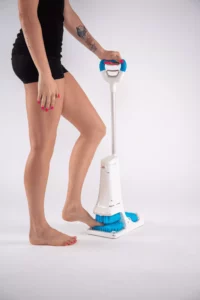When it comes to personal care routines, the health and aesthetics of our feet often take a backseat. Yet, for many, the allure of smooth, well-kept feet is undeniable, leading to the use of various tools and gadgets designed for foot care. Amongst these, foot scrubbers have gained popularity for their ability to exfoliate, remove dead skin, and promote softness. However, as with any self-care regimen that involves our body’s well-being, there arises an important question: Is it necessary to consult a doctor before using a foot scrubber? This article delves into the facets of foot care and the role of foot scrubbers within it, ensuring that readers are well-informed about their choices and the precautions they should take.
Firstly, we will explore the purpose and types of foot scrubbers available in the market. From manual pumice stones to electric pedicure devices, it’s essential to understand how each works and which might be best suited for your needs. Secondly, we will discuss the importance of recognizing skin conditions and foot health issues. Not all feet are the same, and what may be beneficial for one person could be harmful to another, highlighting the need for tailored foot care. Thirdly, the risks and precautions associated with using foot scrubbers will be identified. Improper use can lead to injuries or infections, making it crucial to be aware of how to use these tools correctly.
Furthermore, we will consider the impact of pre-existing health conditions such as diabetes or circulatory problems, which can significantly alter the safety and advisability of using foot scrubbers. Finally, we will provide guidelines for the safe use of foot scrubbers and outline scenarios when it is imperative to seek medical advice. By the end of this article, readers will have a comprehensive understanding of when it is advisable to consult a healthcare professional before incorporating a foot scrubber into their care routine, ensuring both the health and beauty of their feet are maintained responsibly.
Understanding the Purpose and Types of Foot Scrubbers
The purpose of foot scrubbers is to help maintain the health and cleanliness of your feet by removing dead skin cells, exfoliating rough patches, and sometimes to stimulate circulation. There are various types of foot scrubbers available on the market, each designed with different features to cater to specific needs. They range from simple pumice stones and foot files to electric foot exfoliators that can provide more intense scrubbing action.
Manual foot scrubbers, like pumice stones and foot brushes, are typically used with water and can be easily incorporated into your daily shower routine. These are generally considered safe for most people, but it’s important to use them gently to avoid over-exfoliation, which can lead to skin irritation or damage.
Electric foot scrubbers, on the other hand, offer convenience and efficiency, as they do much of the work for you. They can be particularly helpful for those who have difficulty reaching their feet or who have thicker calluses that are hard to remove with manual scrubbers. However, because they are more powerful, there is a higher risk of overuse or injury, which is why some individuals may need to consult a healthcare provider before using these devices, especially if they have underlying health issues.
It is usually not necessary to consult a doctor before using a basic foot scrubber if you have healthy feet. However, if you have diabetes, peripheral neuropathy, or any other condition that affects your feet or circulation, it is crucial to speak with a healthcare professional before using any type of foot scrubbing device. People with these conditions may have an increased risk of infection or injury from using foot scrubbers, and a doctor can provide personalized advice on foot care and recommend appropriate foot scrubbing tools and techniques.
Recognizing Skin Conditions and Foot Health Issues
Recognizing skin conditions and foot health issues is a crucial step before using any foot scrubber. The skin on our feet is subject to a great deal of stress and is often prone to various conditions that can be exacerbated by improper care. For instance, individuals may have undiagnosed skin conditions such as athlete’s foot, psoriasis, or eczema, which could potentially be irritated by aggressive exfoliation.
Moreover, foot health issues like fungal infections, warts, or open sores should be handled with great care. Using a foot scrubber on such conditions without proper medical advice could lead to further complications, such as infections or worsening of the existing condition. It’s particularly important for individuals with diabetes or poor circulation to be cautious, as their feet are more susceptible to infections and ulcers, and they may not heal as quickly as those of a person without such conditions.
Additionally, recognizing signs of infections or other foot problems is not always straightforward. Some infections can be silent or present with very mild symptoms that one might disregard. However, if these issues are not addressed properly, they can escalate into more serious problems that could have been prevented with early medical intervention.
Therefore, it is generally advisable to consult a healthcare provider if there are any concerns regarding the condition of the skin on one’s feet. A doctor can provide a proper assessment and recommend a suitable course of action, which may include the safe use of a foot scrubber as part of a foot care routine. Understanding one’s own foot health is essential in maintaining overall well-being and preventing complications that could arise from the use of foot care tools without proper knowledge or caution.
Identifying Risks and Precautions of Using Foot Scrubbers
Foot scrubbers are commonly used to exfoliate the skin on the feet and remove dead skin cells, potentially aiding in the prevention of calluses and promoting overall foot health. While they are often seen as a straightforward and safe tool for foot care, there are certain risks and precautions that should be taken into account when using foot scrubbers.
Firstly, it is important to consider the physical abrasiveness of the foot scrubber. Some scrubbers may be too harsh for sensitive skin, which can lead to abrasions or micro-tears in the skin. Such injuries can serve as entry points for bacteria and fungi, increasing the risk of infections, particularly in environments like public showers or pools where such pathogens are more prevalent.
Moreover, individuals with diabetes or those with poor circulation in their feet need to be especially cautious. They are at a higher risk for foot complications, and what might be a minor scratch or abrasion for others can lead to serious infections or ulcers for them. For these individuals, even a routine foot scrubbing can necessitate a consultation with a healthcare provider to ensure that it’s done safely.
People with skin conditions such as eczema or psoriasis should also be careful, as the use of foot scrubbers might exacerbate their conditions. It’s essential to identify the type of foot scrubber that is appropriate for their specific condition, which might require input from a dermatologist.
Lastly, it is important to keep foot scrubbers clean and dry between uses to prevent the growth of bacteria and fungi on the scrubber itself. Users should replace foot scrubbers regularly to maintain hygiene and effectiveness.
While foot scrubbers can be beneficial for foot health, identifying their risks and taking the necessary precautions is crucial to avoid complications. For those with existing foot conditions or health concerns, consulting with a healthcare provider before use is advisable to ensure that foot scrubbers are used in a safe manner.
Considering the Impact of Pre-existing Health Conditions
When it comes to the use of foot scrubbers, considering the impact of pre-existing health conditions is crucial. Individuals with certain health conditions may need to be more cautious or even avoid using foot scrubbers without professional advice. For instance, those with diabetes often have reduced sensation in their feet due to neuropathy and may not notice injuries or irritation caused by foot scrubbers. This can lead to sores or infections that do not heal easily, potentially leading to severe complications.
Furthermore, people with circulatory issues, open wounds, or skin infections should also be cautious. Aggressive exfoliation can exacerbate these conditions, causing more harm than good. It’s important for anyone with a pre-existing health condition that affects the feet or skin, such as psoriasis or eczema, to consult a healthcare provider before using a foot scrubber. This ensures that they don’t unintentionally damage their skin or create an entry point for infection.
In general, while foot scrubbers can be beneficial for exfoliating dead skin and keeping feet smooth and clean, they are not suitable for everyone. Individuals with pre-existing health conditions should seek medical advice to determine the safest and most effective way to care for their feet. This may involve the use of specialized foot care tools or products that are gentler and designed for sensitive or compromised skin. Consulting a doctor or a podiatrist can provide tailored advice that takes into account the person’s overall health, the condition of their feet, and their specific needs.
Guidelines for Safe Use and When to Seek Medical Advice
When considering the use of a foot scrubber, it is essential to follow guidelines for safe use to avoid any potential harm. Foot scrubbers are designed to exfoliate the skin, removing dead cells and helping to keep the feet smooth and clean. However, they must be used correctly to prevent skin damage or infection, especially in individuals with sensitive skin or underlying health conditions.
It’s not always necessary to consult a doctor before using a foot scrubber for individuals with generally healthy feet. Nevertheless, there are certain circumstances where medical advice should be sought. For instance, people with diabetes have an increased risk of foot infections and complications due to poor circulation and neuropathy. In such cases, even a minor abrasion from a foot scrubber could lead to serious issues. Therefore, it is highly recommended for diabetic individuals to consult their healthcare provider before using any type of foot scrubbing device.
Additionally, if someone has an existing foot skin condition, such as psoriasis or eczema, they should be cautious. These conditions can be exacerbated by aggressive exfoliation, making it important to discuss the use of a foot scrubber with a dermatologist or podiatrist. They can provide tailored advice on the type and frequency of exfoliation that is safe.
For those who have open wounds, sores, or infections on their feet, using a foot scrubber is not advisable. Doing so can irritate the area further and potentially spread the infection. In these cases, it’s crucial to seek medical advice and allow the area to fully heal before considering the use of a foot scrubber.
In summary, while the use of a foot scrubber can be part of a regular foot care routine for many, guidelines for safe use should be adhered to. When in doubt, especially for individuals with health concerns or unusual symptoms, seeking medical advice is the best course of action to prevent complications and ensure proper foot care.




